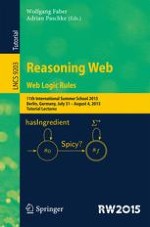2015 | Buch
Reasoning Web. Web Logic Rules
11th International Summer School 2015, Berlin, Germany, July 31- August 4, 2015, Tutorial Lectures.
herausgegeben von: Wolfgang Faber, Adrian Paschke
Verlag: Springer International Publishing
Buchreihe : Lecture Notes in Computer Science
